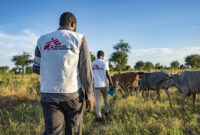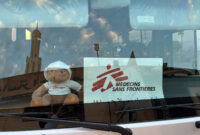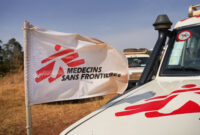Pfizer and Moderna vaccines can only be scaled up globally if more suppliers can produce
As the US Food and Drug Administration (FDA) starts meeting today and later this month to discuss emergency use authorization of both the Pfizer/BioNTech and Moderna COVID-19 vaccine candidates, Doctors Without Borders/Médecins Sans Frontières (MSF) warns that any eventual COVID-19 vaccine approval won’t be enough to solve the global pandemic unless corporations take urgent steps to increase cooperation with other producers and sell the vaccines at-cost. This will mean sharing all the necessary intellectual property (IP), technologies, data and know-how, so that as many companies as possible can produce these lifesaving vaccines.
While the world waits with bated breah for the possible approval of these COVID-19 vaccines, it’s not time to celebrate yet.
Dr Sidney Wong | Msf Access Campaign Executive Co-director
TWEET THIS:
“While the world waits with bated breath for the possible approval of these COVID-19 vaccines, it’s not time to celebrate yet,” said Dr Sidney Wong, Executive Co-Director of MSF’s Access Campaign. “Right now, we’re in a situation where a lion’s share of the limited number of first doses have already been snatched up by a handful of countries like the US and UK, as well as the EU, leaving very little for other countries in the short term. What we really want to see is a rapid expansion of the overall global supply, so there are more vaccines to go around and doses can be allocated according to WHO’s public health criteria, not a country’s ability to pay.”
The expected supply constraints of the first COVID-19 vaccines have been artificially produced by a system that allowed pharmaceutical corporations to decide who would be able to produce these future vaccines. Moderna has been the only company to commit to not enforce its patents during the pandemic. In order to make this promise most meaningful, Moderna should also share all IP, technologies, data and know-how, so that other manufacturers can scale-up production of these potentially lifesaving vaccines. Pfizer/BioNTech have indicated no plans to license or transfer their IP-protected technologies. To increase global manufacturing capacity and supply, Pfizer/BioNTech should pursue global open-licensing and engage in full technology transfers to other vaccine manufacturers. The UK authorized emergency use of their vaccine last week.
Public funding should result in public access
Both vaccine candidates received significant public funding from governments, but none of this money had conditions attached that would guarantee access, including requiring companies to transfer all technology to other vaccine manufacturers, be transparent about their costs, or sell their vaccines at-cost.
Transparency across the board is also critical to ensure access. Both corporations have kept important information including R&D, clinical trial, and manufacturing costs under wraps and out of the public’s view. Unlike other COVID-19 vaccine developers, such as AstraZeneca, that have pledged to sell their vaccine at a ‘no profit’ price during the pandemic, both Pfizer and Moderna have said they will not sell their COVID-19 vaccines at cost.
Moderna has received nearly US$2.5 billion* in US government public funds and yet it has been reported that Moderna has proposed a price of $50-74 per person (for the required two doses) for high-income countries, including the US, one of the highest prices for a potential COVID-19 vaccine cited to date. It is not clear at this point how much they plan to charge in low- or middle-income countries. The Pfizer vaccine candidate development was supported by a grant of nearly $443 million from the German government through its partner BioNTech, and a loan of over $118 million from the European Investment Bank. Pfizer is reportedly aiming for a price of $40 per person (for the required two doses).
“In a oment of such important advancements that provide a lot of hope, it is disheartening to see pharma keep information that’s crucial for ensuring access and affordability hidden from public scrutiny,” said Dana Gill, US Policy Advisor for MSF’s Access Campaign. “By withholding critical information like the costs of R&D, clinical trials, and manufacture, governments and pharmaceutical corporations are shirking their responsibilities to the taxpayers and public entities who funded the development of these vaccines and will pay for them. The public has a right to know. Without transparency, the public cannot assess fair pricing and governments cannot negotiate lower prices based on true costs. Pfizer and Moderna should set a new example of accountability and open their books. No company should be allowed to profiteer off the back of this pandemic.”
The public has a right to know. Without transparency, the public cannot assess fair pricing and governments cannot negotiate lower prices based on true costs.
Dana Gill | Msf Access Campaign US Policy Advisor
TWEET THIS:
Ensuring their equitable access is not only a question of sufficient supply and an affordable price, but also an enormous logistical challenge since both vaccines require extraordinary cold chain management. Moderna’s candidate must be shipped at -20 degrees Celsius, and Pfizer/BioNTech’s vaccine requires -70 degrees Celsius temperatures, colder than Artic-winter temperatures (ultra-cold chain management). This poses a challenge to transport, store and use across all settings, especially low-resource settings where MSF works.
* Moderna received US$483 million in April, $472 million in July, and $1.525 billion in August.










